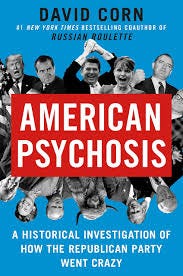Notes for 05/31/25
MDs going to Canada, Competing loyalties between friends and families, Effects of psychosis on populations
American Doctors Are Moving To Canada To Escape The Trump Administration
Earlier this year, as President Donald Trump was beginning to reshape the American government, Michael, an emergency room doctor who was born, raised, and trained in the United States, packed up his family and got out. Michael now works in a small-town hospital in Canada. KFF Health News and NPR granted him anonymity because of fears he might face reprisal from the Trump administration if he returns to the U.S. He said he feels some guilt that he did not stay to resist the Trump agenda but is assured in his decision to leave. Too much of America has simply grown too comfortable with violence and cruelty, he said. (KFF Health News 05/30/35)
It’s not just the Trump administration but the profit making health care system which contributes to what is being called “moral injury” in American health care providers.
—--------------
Competing loyalties of friends and family - As I have aged I have learned that my friends are much more dependable and supportive than my family. Perhaps this reflects more on my family system than society in general, but in my work with clients I find this phenomenon much more common contributing to great grief that is disenfranchised when adult children are not as available to their parents than the parents would like.
The common dynamic is that parents have made many attempts to engage with their adult children and the adult children have rebuffed these attempts or sometimes even "ghosted" the parent failing to respond with many excuses when a connection is finally made. In these situations I frame the experience as grief and encourage the parent to invest in other circles of emotional connection.
Friends are what I call the "intentional family " as compared to the family or origin. The purpose of family has changed a lot over the generations and from culture to culture. Expectations about traditional family dynamics are more based on romantic myth than reality.
So the suggestion for the class of 2025 that they "gather their friends tight' stimulated the question of what about respect and support the elders in their family and in their community?This raises a further question about what is the role of the elder in our current society if there is one? And where does one's loyalties lie to friends or family? When there's a conflict between the competing needs of friends and families, which do you choose first? As therapists how do we help people sort this out? What are our own experiences and how does this countertransference manifest as we frame our discussions with our clients? (David G. Markham to Clinicians' Exchange ton 05/31/25)
—---------------------
The effect of psychosis on populations - Most people don't recognize the seriousness of Trump's mental illness. He has a grandiose sense of entitlement and omniscience that in a psychiatric setting would be labeled as psychotic. I have worked with many patients like this over my 56 years of practice as a Psychiatric Social Worker. The interesting thing is not Trump's psychosis but the number of people he has spread his psychosis to.
Psychosis can be contagious and spread to groups. This phenomenon is called a "folie au deux" because the psychotic belief system is shared by two or more people.
Another psychological phenomenon which Trump and his followers manifest is what is called the Dunning Kruger effect. The Dunning - Kruger effect is manifested when people low in competence overestimate their abilities. The Dunning - Kruger effect is manifested not only Donald Trump but by his supporters as well.
The hopeful insight is that reality is at times a hard teacher when psychotic beliefs and overestimation of one's knowledge and skills lead to harmful consequences. Because of these likely outcomes, giving power to psychotic people and people with the Dunning-Kruger complex is a very dangerous and ill advised thing to do because the negative consequences for people impacted by the decisions of people suffering from these maladies can be very destructive. The best way of managing these mental health problems is encapsulation and avoidance.
(David G. Markham post to Allnonfiction on 05/31/25)

